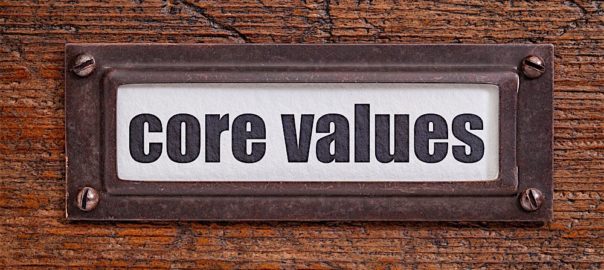How To Establish Your Business Core Values
By JD Esajian on August 16, 2017
Investing in real estate is an emotional experience. There are so many wild swings every day that it is easy getting caught up and possibly saying or doing something you regret. All it takes is one emotional decision to set your business on the wrong course. The best investors are not only disciplined but they also have a set of ground rules behind them. These are the little, and not so little, declarations for how to run their business. As difficult as it may be if something doesn’t fit these rules they walk away from a deal or a situation. This helps them avoid negative situations and only take positive steps in their business. Your ground rules can be completely specific to your goals and personality but you should have something in place to help stay on track. Here are five ground rules every investor should consider.
- No round pegs in square holes. It cannot be stated enough that not every property you pursue makes a good investment. There is a huge difference in a property you would consider living in and one you can make money with. As an investor, the numbers are the most important thing. If the numbers don’t work you need to walk away from the property regardless of how you feel about it. The neighborhood may be nice and the layout may look appealing but investing is based on numbers. Never waste time, money or energy on deals you aren’t 100% interested in. You should know pretty quickly whether a property is worth pursuing. Once you decide to move on you need to turn the page and not look back. The worst thing you can do is buy a property simply because you are board or you think you can make any property work. Never try to fit a round peg property in a square hole.
- Always consider value. It is no secret that almost every new investor wants to be a rehabber. They have seen one of the multiple shows on TV and think they can do the same. While it is true that anyone can flip real estate not every rehab yields a massive profit. It takes a combination of picking properties in the right market with doing the right work. A simple rule with any rehab is to think about ways to create value. The basic concept with any rehab is to buy low, add value and sell for a profit. Not everything you do will add value. If you don’t do the right work or make the right improvements you can do more harm than good. You may think that an expensive swimming pool will help find buyers but not at the expense of the back yard. You can’t just make upgrades for the sake of improvement. You need to always think to yourself how the work you do directly impacts value. If you can’t answer maybe you should think about not doing it or tweaking what you had in mind.
- Reinvest profits back into business. Regardless of how many deals you close a year investing in real estate should be treated like a business. With that a certain amount of money needs to be funneled back into your business to keep it running smoothly. Here is where many investors, regardless of experience, run into trouble. Closing a rehab deal is a great feeling and the cumulation of months of hard work. There is a natural reaction to take a deep breath and celebrate your accomplishments. The reality is that if investing is your full-time job you need to use these funds to cover personal expenses and invest in business growth before you do anything else. This may not leave you with much left over but if you blow the money on frivolous items you will have essentially worked the last few months for nothing.
- Know the numbers. As popular as rehab investing has become it is not the only way to invest. There are still many investors who only entertain buy and hold investment properties. A good rental property can produce cash flow and help grow equity for years to come. Just like with a rehab not every rental property makes a good investment. With buy and hold properties it is essential that you know all the numbers associated. Missing or overlooking just a few sets of expenses completely changes the monthly cash flow. This impacts how you view the property and may cause you to regret your purchase after just a few months. Always check, and double check, all the numbers in every rental property purchase you make.
- Avoid excessive debt. Nothing brings a business down faster than excessive debt. There are times when debt can help grow a business but too many times debt has a negative impact. The more debt you have the more you need to make just to break even. Increased amounts of debt can make you feel like you are constantly running up hill and working for nothing. If you find yourself relying too much on debt you need to put the brakes on and stop. Dedicate the next deal or two to paying down debt even if you don’t take a draw for yourself. This will be a lean couple of months but a few leans months is better than drowning in debt a year down the road.
Whatever guidelines you come up with will help drive your business. Take your time and think about what is really important to you. Once these are in place you should use them to help guide every business decision you make.